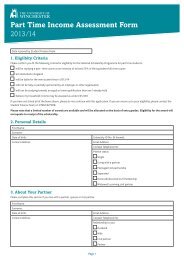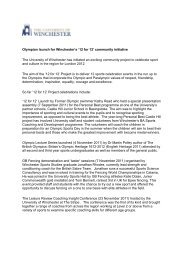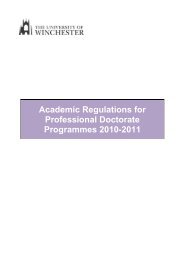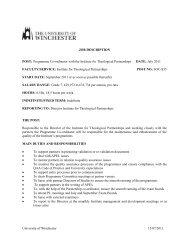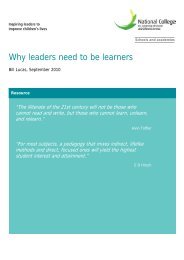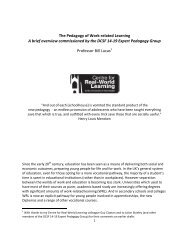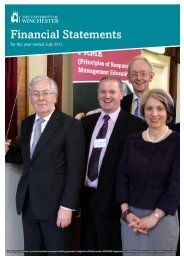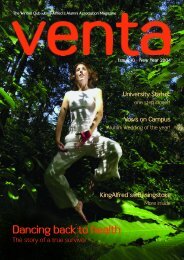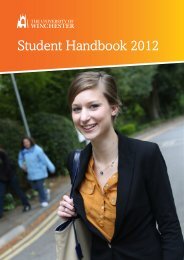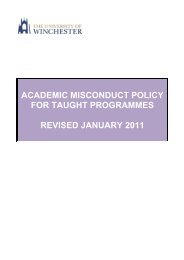Gender Equality Scheme - University of Winchester
Gender Equality Scheme - University of Winchester
Gender Equality Scheme - University of Winchester
Create successful ePaper yourself
Turn your PDF publications into a flip-book with our unique Google optimized e-Paper software.
Four comments from responses to the questionnaire were used in discussion at<br />
each focus group:<br />
• Formal processes are likely already to have been written with equality in<br />
mind. What happens on the ground however and especially between<br />
colleagues is far harder to discover.<br />
• Danger <strong>of</strong> over emphasis on discrimination against women as an issue to<br />
the exclusion <strong>of</strong> discrimination against men<br />
• There are wider cultural factors that the <strong>University</strong> could do its bit in<br />
addressing e.g. overcoming stereotypical gender roles<br />
• Women are underrepresented because they do not hold an appropriate<br />
proportion <strong>of</strong> positions <strong>of</strong> responsibility within the <strong>University</strong><br />
Seven focus groups were held. 28 members <strong>of</strong> staff were consulted via focus<br />
groups, 20 female and 8 male. Of these, 15 were academic staff, 10 were<br />
support staff and 3 were management staff.<br />
In general, support staff did not perceive gender inequality. Support staff<br />
seemed to feel that an issue was being made when no issue was perceived.<br />
Whereas academic staff did perceive inequality, with specific concerns over<br />
career progression, flexible working and availability <strong>of</strong> (academic) part-time/job<br />
share posts, allocation <strong>of</strong> workload (and how work was valued) and child care.<br />
This supported comments that had been raised through the questionnaire.<br />
?.9 Summary <strong>of</strong> Results <strong>of</strong> Student Questionnaire<br />
A student questionnaire was administered to Union Council and received 15<br />
responses. 7 men (46.6 . %) and 8 women (53.3 . %) responded to the<br />
questionnaire.<br />
Of the respondents, 11 were in level 3 <strong>of</strong> study, 2 were level 2 and 1 was level<br />
1. 1 respondent did not declare this information.<br />
5 respondents were undergraduates, 1 was postgraduate and the remaining did<br />
not declare this information.<br />
Seven respondents came from Arts, 6 from Social Sciences and the remaining<br />
from Arts/Education and Arts/Social Sciences.<br />
The overwhelming responses from the student questionnaire were that there<br />
was no perception <strong>of</strong> sex discrimination or gender inequality. The only points<br />
raised were regarding the allocation <strong>of</strong> all-male flats on the ground floor <strong>of</strong>




